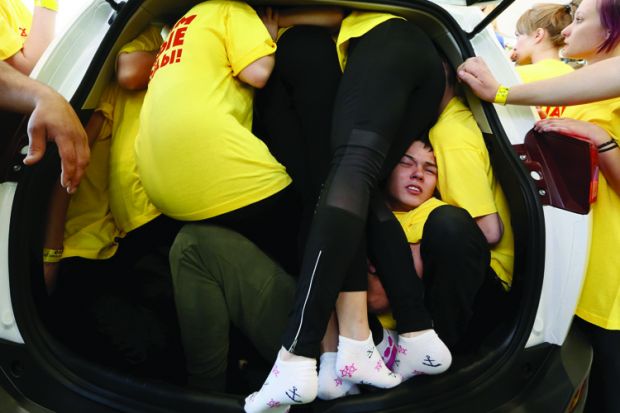Internationalisation has become central to universities’ activities around the world in recent decades.
But, in this process, have academic values and principles been protected, or has the pursuit of profit, with the consequent prioritising of quantity over quality, come to the fore?
Have the benefits of globalisation been shared by all students and staff, or have they been enjoyed by an elite few?
These are among the questions addressed by a major report, Internationalisation of Higher Education, which was prepared for the European Parliament by Hans de Wit and Fiona Hunter of the Centre for Higher Education Internationalisation at Milan’s Catholic University of the Sacred Heart, Laura Howard of the European Association for International Education, and Eva Egron-Polak of the International Association of Universities.
It draws on two major surveys, carried out by the EAIE and the IAU, as well as profiles of internationalisation activities in 10 European countries and seven more around the world.
In particular, the report looks at the extent to which internationalisation activities remain focused on the mobility of students and staff, and transnational delivery of courses; and how far institutions have progressed with “internationalisation at home” – the development of intercultural programmes of study that educate global citizens for life in an interconnected world.
In the report’s conclusion, Professor de Wit, Dr Hunter and Robert Coelen, professor of internationalisation of higher education at Stenden University of Applied Sciences in the Netherlands, determine that institutions are “still predominantly focused” on mobility. Governments around the world are largely focused on economic gains, attracting talented scholars and boosting international reputation, the trio say.
In contrast, while internationalisation at home has been listed as a priority, it will require “more concrete actions” at European, national and, in particular, institutional level, to make this a reality, they add.
The report does also acknowledge the benefits of mobility, highlighting the success of the European Union’s Erasmus programme in boosting graduate employability and academic research.
But the report argues that international mobility will only ever benefit an “elite” of perhaps 10 to 20 per cent of students and staff and that internationalisation at home should not be seen as a “consolation prize for non-mobile non-elites”.
An internationalised curriculum can be a “more inclusive” approach, the report says, through approaches such as the use of comparative literature, guest lecturers or digital collaboration.
Professor de Wit told Times Higher Education that focusing on mobility also risked making countries dependent on a small number of countries for internationalisation, with a subsequent limit on diversity. An example would be the UK’s growing dependence on China for overseas students.
“The benefit of an international curriculum is that you can deal with all students, not a small elite who have the money and interest to go abroad,” Professor de Wit said. “With an international programme you are creating more understanding of global issues and research, and reaching much larger numbers of graduates who will be working in a globalised world.”
Key challenges
So what are the barriers to a more comprehensive approach to internationalisation?
The report highlights that funding is a key challenge for all universities and that institutions in some Central and Eastern European countries in particular are strongly reliant on European grants, lacking “any substantial investment” in internationalisation from national or institutional resources.
As a consequence, the report says that there has been a trend away from cooperation between institutions towards competition.
“There is an evident shift…from an almost exclusive focus on cooperation and exchange to a broader understanding of internationalisation that includes the race for talent, international student recruitment, strategic partnerships, income generation, rankings and institutional positioning.”
The report adds: “Demographic decline and shrinking national funding mean that increasing numbers of higher education institutions are shifting their focus to short-term economic gain.”
The report links this to increasing privatisation of international higher education, particularly in Central and Eastern Europe, and adds that increasing student numbers have “led to a debate on quantity versus quality in a number of countries”.
Development of strong quality assurance mechanisms for internationalisation is “increasingly perceived as key to providing a high level of education and service to students and in creating transparent institutional standards”, the report says.
The researchers also highlight the need for academic staff to be given stronger incentives to engage in internationalisation activities, with potential for it to be given greater recognition in promotion and salary decisions.
“The reward system is very much on research, not teaching and learning, so academics see internationalisation as an additional burden, not a process that they are really getting rewarded for,” Professor de Wit told THE.
More importantly, however, the report argues that the importance of higher education “in social engagement and in the development of global and European citizenship for students and staff must not be lost or forgotten”.
University education as a public good is “not necessarily in conflict with increased entrepreneurship and private ownership”, the report says.
But it concludes: “Given that internationalisation has become increasingly driven by economic rationales and an ‘international higher education industry’ has emerged, there is a clear danger that academic values and principles are at risk.”
This is not to say that there are not barriers also remaining to internationalisation in the sense of mobility, and the report highlights a number of these.
Tuition fee and scholarship schemes across Europe and around the world are diverse, with the variation acting as an obstacle to mobility and cooperation, the report says. The removal of these obstacles is “needed to increase opportunities for mobility and cooperation”, the report says.
Notwithstanding the progress that has been made via the Bologna Process towards normalisation of qualifications and standards, the report says that there are still “substantial differences” in higher education systems and procedures, particularly in Central and Eastern Europe. These are particularly problematic when universities attempt to develop joint degrees.
And, as English becomes increasingly dominant as the language of communication in research and education, the report says that universities need to encourage multilingual learning at primary and secondary schools so this can be a basis for increased diversity across Europe.
To this list of challenges can be added ongoing debates about immigration, in the UK and elsewhere, as well as continuing religious and ethnic tensions.
But if these barriers can be overcome, the report’s authors argue that the potential for internationalisation is bright.
“While these challenges represent a threat, they also raise our awareness of the importance of the internationalisation of higher education in developing a meaningful response,” the report says.
POSTSCRIPT:
Print headline: Academic values ‘at risk’ in ‘race for talent’
Register to continue
Why register?
- Registration is free and only takes a moment
- Once registered, you can read 3 articles a month
- Sign up for our newsletter
Subscribe
Or subscribe for unlimited access to:
- Unlimited access to news, views, insights & reviews
- Digital editions
- Digital access to THE’s university and college rankings analysis
Already registered or a current subscriber?






